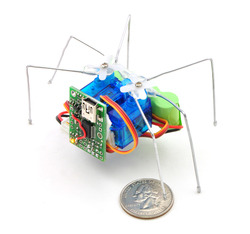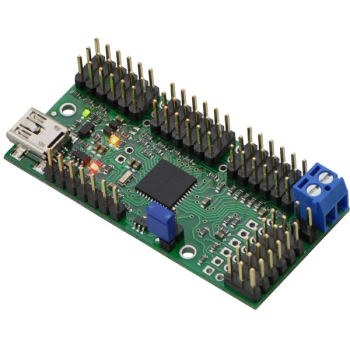The 24-channel Mini Maestro 24 raises the performance bar for serial servo controllers with features such as a native USB interface and internal scripting control. Whether you want the best servo control available (0.25μs resolution with built-in speed and acceleration control and pulse rates up to 333 Hz) or a general I/O controller (e.g. to interface with a sensor or ESC via your USB port), this compact, versatile device will deliver. This fully-assembled version ships with header pins installed.
The Mini Maestros are the newest of Pololu’s second-generation USB servo controllers, offering more channels and features than the smaller six-channel Micro Maestro. The Mini Maestros are available in three sizes, the other sizes are:
- Mini Maestro 12
- Mini Maestro 18
See related products below.
The Mini Maestros are highly versatile (and compact) servo controllers and general-purpose I/O boards. They support three control methods: USB for direct connection to a computer, TTL serial for use with embedded systems, and internal scripting for self-contained, host controller-free applications. The channels can be configured as servo outputs for use with radio control (RC) servos or electronic speed controls (ESCs), as digital outputs, or as analog/digital inputs. The extremely precise, high-resolution servo pulses have a jitter of less than 200 ns, making these servo controllers well suited for high-performance applications such as robotics and animatronics, and built-in speed and acceleration control for each channel make it easy to achieve smooth, seamless movements without requiring the control source to constantly compute and stream intermediate position updates to the Mini Maestros. The Mini Maestros also feature configurable pulse rates from 1 to 333 Hz and can generate a wide range of pulses, allowing maximum responsiveness and range from modern servos. Units can be daisy-chained with additional Pololu servo and motor controllers on a single serial line.
A free configuration and control program is available for Windows and Linux, making it simple to configure and test the device over USB, create sequences of servo movements for animatronics or walking robots, and write, step through, and run scripts stored in the servo controller. The Mini Maestros’ 8 KB of internal script memory allows storage of up to approximately 3000 servo positions that can be automatically played back without any computer or external microcontroller connected.
Because the Mini Maestros’ channels can also be used as general-purpose digital outputs and analog or digital inputs, they provide an easy way to read sensors and control peripherals directly from a PC over USB, and these channels can be used with the scripting system to enable creation of self-contained animatronic displays that respond to external stimuli and trigger additional events beyond just moving servos.
The fully assembled versions of the Mini Maestro ship with 0.1" male header pins installed as shown in the respective product pictures. A USB A to mini-B cable (not included) is required to connect this device to a computer.
Main Features
- Three control methods: USB, TTL (5V) serial, and internal scripting
- 0.25μs output pulse width resolution (corresponds to approximately 0.025° for a typical servo, which is beyond what the servo could resolve)
- Pulse rate configurable from 1 to 333 Hz (2)
- Wide pulse range of 64 to 4080 μs (2)
- Individual speed and acceleration control for each channel
- Channels can be optionally configured to go to a specified position or turn off on startup or error
- Alternate channel functions allow the channels to be used as:
- General-purpose digital outputs (0 or 5 V)
- Analog or digital inputs (channels 0 – 11 can be analog inputs; channels 12+ can be digital inputs)
- One channel can be a PWM output with frequency from 2.93 kHz to 12 MHz and up to 10 bits of resolution
- A simple scripting language lets you program the controller to perform complex actions even after its USB and serial connections are removed
- Free configuration and control application for Windows and Linux makes it easy to:
- Configure and test your controller
- Create, run, and save sequences of servo movements for animatronics and walking robots
- Write, step through, and run scripts stored in the servo controller
- Two ways to write software to control the Maestro from a PC:
- Virtual COM port makes it easy to send serial commands from any development environment that supports serial communication
- Pololu USB Software Development Kit (listed under the resources tab) allows use of more advanced native USB commands and includes example code in C#
- TTL serial features:
- Supports 300 – 200,000 bps in fixed-baud mode, 300 – 115,200 bps in autodetect-baud mode (2)
- Simultaneously supports the Pololu protocol, which gives access to advanced functionality, and the simpler Scott Edwards MiniSSC II protocol (there is no need to configure the device for a particular protocol mode)
- Can be daisy-chained with other Pololu servo and motor controllers using a single serial transmit line
- Chain input allows reception of data from multiple Mini Maestros using a single serial receive line without extra components (does not apply to Micro Maestros)
- Can function as a general-purpose USB-to-TTL serial adapter for projects controlled from a PC
- Board can be powered off of USB or a 5 – 16 V battery, and it makes the regulated 5V available to the user
- Upgradable firmware
Maestro Comparison Table
 |  |  |  | |
|---|---|---|---|---|
| Micro Maestro | Mini Maestro 12 | Mini Maestro 18 | Mini Maestro 24 | |
| Channels: | 6 | 12 | 18 | 24 |
| Analog input channels: | 6 | 12 | 12 | 12 |
| Digital input channels: | 0 | 0 | 6 | 12 |
| Width: | 0.85" (2.16 cm) | 1.10" (2.79 cm) | 1.10" (2.79 cm) | 1.10" (2.79 cm) |
| Length: | 1.20" (3.05 cm) | 1.42" (3.61 cm) | 1.80" (4.57 cm) | 2.30" (5.84 cm) |
| Weight(1): | 3.0 g | 4.2 g | 4.9 g | 6.0 g |
| Configurable pulse rate(2): | 33–100 Hz | 1–333 Hz | 1–333 Hz | 1–333 Hz |
| Pulse range(2): | 64–3280 μs | 64–4080 μs | 64–4080 μs | 64–4080 μs |
| Script size(3): | 1 KB | 8 KB | 8 KB | 8 KB |
1 This is the weight of the board without header pins or terminal blocks.
2 The available pulse rate and range depend on each other and factors such as baud rate and number of channels used. See the Maestro User’s Guide for details.
3 The user script system is more powerful on the Mini Maestro than on the Micro Maestro. See See the Maestro User’s Guide for details.
Application Examples and Videos
 |
| Micro Maestro as the brains of a tiny hexapod robot. |
|---|
- Serial servo controller for multi-servo projects (e.g. robot arms, animatronics, fun-house displays) based on microcontroller boards such as the BASIC Stamp, Orangutan robot controllers, or Arduino platforms
- Computer-based servo control over USB port
- Computer interface for sensors and other electronics:
- Read a gyro or accelerometer from a computer for novel user interfaces
- Control a string of ShiftBrites from a computer for mood lighting
- General I/O expansion for microcontroller projects
- Programmable, self-contained Halloween or Christmas display controller that responds to sensors
- Self-contained servo tester
| Size: | 28mm x 36mm |
|---|---|
| Weight: | 7.3 g |
General specifications
| Channels: | 12 |
|---|---|
| Baud: | 300 - 200000 bps1 |
| Minimum operating voltage: | 5 V |
| Maximum operating voltage: | 16 V |
| Supply current: | 40 mA2 |
Notes:
- 1
- Autodetect works from 300 - 115200 bps.
- 2
- With USB disconnected and all LEDs on. Connecting USB draws around 10 mA more.
Recommended links
- Maestro Support for RoboRealm
- The Pololu Maestro RoboRealm module provides a way to interface the visual processing of RoboRealm into servo movements using the Pololu Maestro USB Servo Controller. Released February, 2010.
- Paparazzi Autopilot for Linux
- Patrick Hickey and Bradley Lord use a Pololu Micro Maestro for servo output and a Pololu 4 servo multiplexer to support manual control override in their model aircraft autopilot project. Published February, 2010.
- Obstacle Avoider
- A simple obstacle-avoiding robot based on the Mini Maestro and two continuous-rotation servos. By TomatoWire, June 2010.

